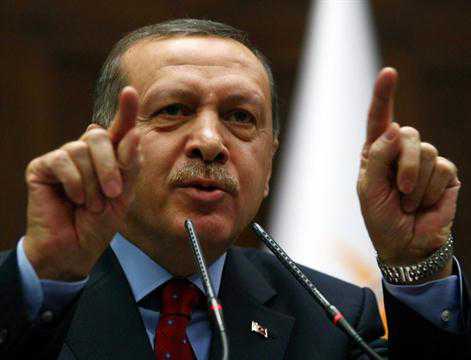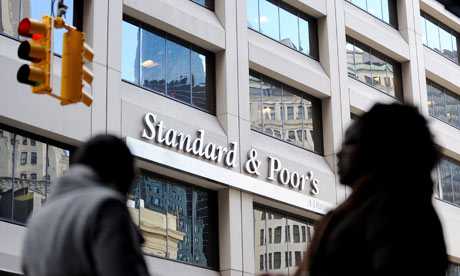By Joe Parkinson
It’s no secret that there’s little love lost between Turkey’s policy makers and ratings firms.
Turkish cabinet ministers and central-bank officials have long bemoaned raters’ stance on Europe’s fastest-growing economy, stressing that Turkey’s credit rating – which all three big firms rank below investment grade – is too low. Ankara has repeatedly fulminated against Fitch, Moody’s and Standard & Poor’s, hurling accusations of an anti-Turkish bias in their sovereign-ratings analysis. After Fitch lowered Turkey’s outlook in November, Economy Minister Zafer Caglayan said the company couldn’t be independent since it was 60% owned by French investors.
But relations appear to have hit a new low this week. On Tuesday, S&P cut Turkey’s outlook to stable from positive, saying risks to its creditworthiness have risen as a result of high debt and worsening terms of trade as demand for its exports weakens.
“Less-buoyant external demand and worsening terms of trade have, in our view, made economic rebalancing more difficult, and have increased the risks to Turkey’s creditworthiness given its high external debt and the state budget’s reliance on indirect tax revenues,” S&P said in a statement.
Many economists said the outlook change was partly spurred by growing fears over Turkey’s current-account deficit, which exceeds 10% of gross domestic product.
But Turkey’s cabinet reacted furiously, fanning out across the airwaves to decry the decision. On Thursday, Prime Minister Recep Tayyip Erdogan offered the latest salvo, accusing S&P of making an “ideological decision” and threatening to withdraw Turkey’s recognition of the agency as a legitimate credit institution.
“If necessary I will say, I do not recognize you as a credit institution,” Mr. Erdogan said in a speech in Istanbul. “Why are you reducing the credit note of a country which has been on the positive side for a while,” he added, in reference to S&P’s Wednesday upgrade of Greece’s credit rating to triple-C after Athens completed a major debt writedown with private creditors. S&P rates Turkey at double-B, two notches below investment grade.
The Prime Minister’s comments came just hours after Finance Minister Mehmet Simsek said the data S&P used to make its decision were outdated. Deputy Prime Minister Bulent Arinc said late Wednesday that S&P’s decision was “unfair and inappropriate,” adding that it was based on inaccurate data.
Turkish policy makers point to recent growth numbers — the economy expanded 8.5% last year; the second fastest expansion of any Group of 20 economy bar China — as evidence that Turkish fundamentals are good and the country’s rating should be higher.
Some economists agree. “I think many in the market would have a lot of sympathy for Erdogan and Turkey. The rating agencies have consistently got Turkey wrong, and it is two to three notches mis-rated by any fair assessment,” said Royal Bank of Scotland economist Tim Ash, a known skeptic of ratings companies’ views of Turkey’s creditworthiness. “It should be investment-grade already.”
Credit-default swap markets also suggest Turkey should have a higher rating; they have traded at levels that would imply a rating above investment grade for months, economists say.
Still, although some market players have argued that Turkish fundamentals warrant a higher credit rating, markets also have been repeatedly unnerved by the rapid expansion of the current-account deficit and concerns over the central bank’s unorthodox monetary policy. That external financing weakness makes Turkey vulnerable to a hard landing should the global economy hit another bump in the road, causing external financing to dry up.
Another concern over Turkey’s economy – inflation – was in focus on Thursday, as new data showed that prices rose at their fastest pace for three and a half years in April as energy and food costs jumped.
This time last year, many investors predicted that an election victory for Turkey’s governing AKP party and continued economic growth and budget consolidation could mean Turkey would be a member of the investment-grade club by now. Those boxes may have been ticked, but a credit-rating upgrade – and a potential thaw in relations between Turkey and the ratings agencies – still looks some way off.
via Turkey and the Raters: The Love Story Continues – Emerging Europe Real Time – WSJ.



